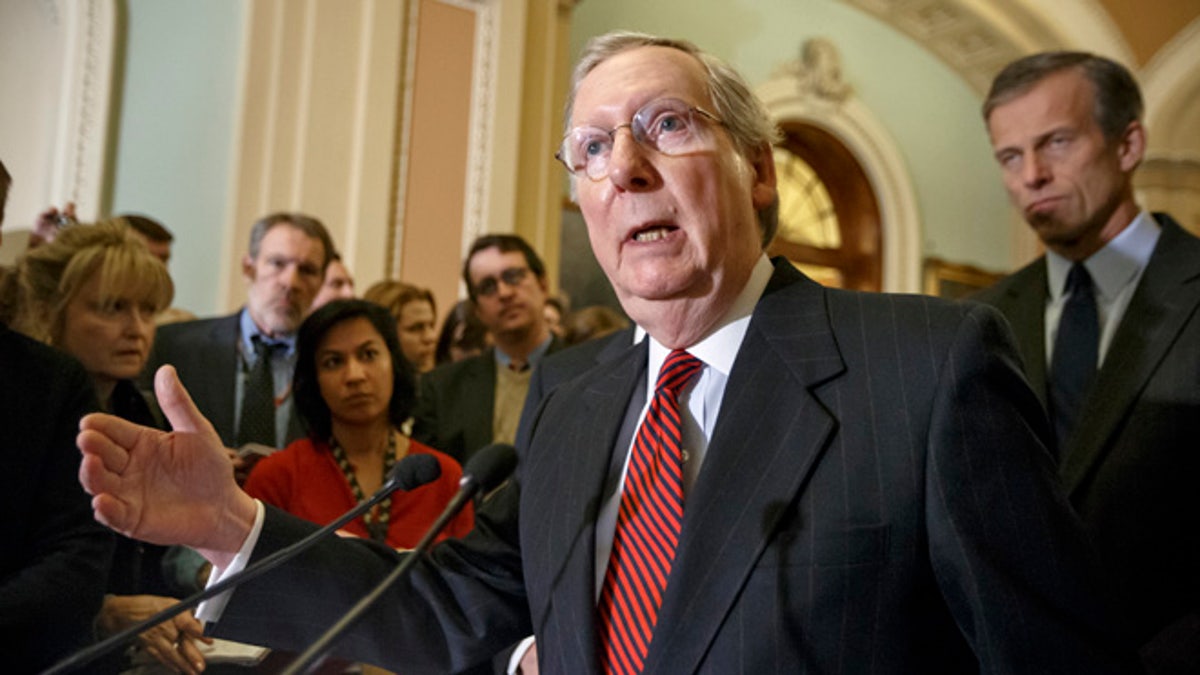
Senate Majority Leader Mitch McConnell of Ky., accompanied by Sen. John Thune, R-S.D., right, meets with reporters on Capitol Hill in Washington, Tuesday, Feb. 24, 2015, to talk about his move to disentangle one of two contested immigration measures from the Homeland Security budget and debate the issues separately, as the Senate faces an impasse over provisions attached to the spending bill aimed at blocking President Barack Obama's executive actions on immigration. (AP Photo/J. Scott Applewhite)
WASHINGTON (AP) – Senate Democrats on Wednesday signed onto a Republican plan to fund the Homeland Security Department without the immigration provisions opposed by President Barack Obama. The announcement by Senate Minority Leader Harry Reid put the Senate on track to pass the bill as a partial agency shutdown looms Friday at midnight.
"It's an important step to be able to send to the House of Representatives a bill that funds the Department of Homeland Security," Reid told reporters after a closed-door meeting with fellow Democrats. "We look forward to working with our Republican colleagues in the next 24 hours to get this done. All eyes now shift to the House of Representatives as soon as we pass our clean funding bill."
The House's response was uncertain. Earlier Wednesday, House Republicans reacted tepidly at best to the plan from Senate Majority Leader Mitch McConnell, who proposed decoupling the issue of DHS funding from immigration.
House Speaker John Boehner declined repeatedly to say what he would recommend to his conservative, fractious rank-and-file if the funding bill clears the Republican-controlled Senate.
"I'm waiting for the Senate to act. The House has done their job," he said after a closed-door meeting of the rank-and-file. Even so, lawmakers were told to be prepared to spend the weekend in the Capitol to resolve the issue.
Boehner and McConnell were to meet on the issue later Tuesday.
Republican Rep. Pete King of New York predicted flatly that a stand-alone spending measure would clear the House if it first passed the Senate.
Yet he acknowledged that is not the preferred course of action for most members of the Republican rank and file, and there was ample evidence of that.
Rep. Tim Huelskamp, R-Kan., said there was scant support expressed inside a House GOP meeting for what he termed a "surrender plan."
Another frequent Republican rebel, Rep. Matt Salmon of Arizona, said Boehner would find himself on "very thin ice" if he relied primarily on Democratic votes to pass a DHS funding bill stripped of provisions to roll back immigration directives that President Barack Obama issued in 2012 and last year.
House Republicans reacted as the administration stepped up the pressure on the GOP to fund an agency with major anti-terrorism responsibilities.
DHS Secretary Jeh Johnson said that without legislation to set new spending levels, there would be no money for new initiatives such as "border security on the southern border." He also said disaster relief payments "would grind to a halt."
Officials have said that more than 85 percent of the agency's work force — 200,000 out of 230,000 employees— would continue to work even if the funding were not approved, because they are deemed essential for the protection of human life and property. That includes front-line workers at the Customs and Border Patrol, the Secret Service and the Transportation Security Administration.
Johnson also said a short-term extension would be problematic and that inadequate funding after Friday's midnight deadline would deal the department a substantial blow.
"It's like trying to drive across country on no more than five gallons of gas at a time and you don't know when the next gas station is going to appear," he said.
For his part, Obama arranged to deliver an immigration-related speech later Wednesday in Miami, home to a large immigrant population.
McConnell's proposal envisioned two separate votes, one on a bill to fund the Homeland Security Department, and the other to overturn Obama's recent executive actions sparing millions of immigrants in this country illegally from deportation.
Yet with a partial shutdown set to trigger at midnight Friday without congressional action, options were few for Republicans who won full control of Congress in November's midterm elections in part on promises to block Obama's immigration policies.
They could allow the agency's funding to expire, violating their leaders' promises that there would be no more shutdowns on the GOP watch. They could try to pass a short-term extension of current funding levels, postponing the conflict to another day. Or they could go along with McConnell's strategy of funding the agency fully while registering their disapproval of Obama's immigration policies with a separate vote.
"I don't know what's not to like about this," McConnell said. "This is an approach that respects both points of view and gives senators an opportunity to go on record on both, both funding the Department of Homeland Security and expressing their opposition to what the president did last November."
There was criticism from some Senate conservatives, notably Ted Cruz of Texas, a potential 2016 presidential candidate. But it was unclear how widespread the sentiment was.
The struggle dates to last fall, when Boehner told fellow Republicans they should allow the funding of Homeland Security without conditions until after the elections, when Republicans would have more leverage.










































